
Conjugated linoleic acid, or CLA for short, is a weight loss and health-promoting supplement that’s derived from a type of protein that’s in dairy and meat.
It’s safe, biologically active, and popular among both weight loss and body-building enthusiasts.
We researched the best CLA supplements on the market and here’s what we came up with.
1. NatureWise Elite CLA 1300
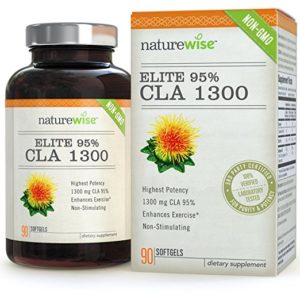
Click here for the lowest price on Amazon
If you want the best and most pure CLA supplement out there, NatureWise is the way to go. The “elite” NatureWise CLA supplement delivers 1300 mg of 95% pure conjugated linoleic acid per capsule, so it really packs a punch.
It’s certified non-GMO, so it doesn’t use genetically modified ingredients, and is guaranteed to be free of common food allergens. It uses a gelatin softgel, so strict vegetarians and vegans will have to look elsewhere.
The amount of capsules per bottle is only sixty, so you’ll have to reorder often if you are regularly taking multi-gram doses.
2. Sports Research Max Potency CLA 1250
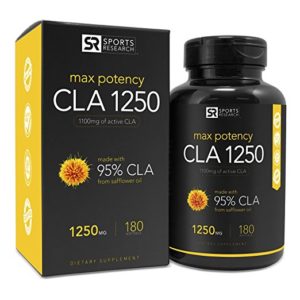
Click here for the lowest price on Amazon
Sports Research offers two forms of CLA, but the kind you want to get is the Max Potency version. It’s got 95% pure conjugated linoleic acid per capsule, derived from non-GMO safflower oil, and it comes in a veggie cellulose capsule.
Each serving provides 1187 mg of actual CLA (95% of 1250). It also has no extraneous oils or fillers; you are getting pretty much pure conjugated linoleic acid, save for a few binders and stabilizers.
If all you care about is high-dose CLA, this is one of the best products on the market.
3. aSquared Nutrition CLA 1250
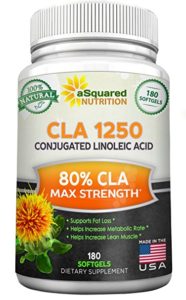
Click here for the lowest price on Amazon
aSquared Nutrition’s MO is focusing on popular weight loss supplements and delivering them to the masses. This is pretty much the story with their conjugated linoleic acid supplement.
It’s solid, but nothing special. It delivers 1250 mg of CLA per capsule, but it’s only 80% pure versus the 95% of some of the other top brands on the market. The good news is that it doesn’t include any extra oils to pad the fatty aid content on the label, so you know exactly what you’re paying for.
4. GNC Total Lean CLA
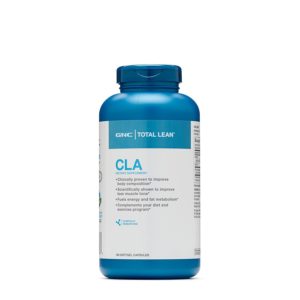
Click here for the lowest price on Amazon
You might not expect the old-school brick and mortar supplement company GNC to be on top of their game when it comes to new supplements, but their CLA offering is pretty good.
It’s a high-dose, no-nonsense conjugated linoleic acid supplement that provides 1000 mg of CLA per capsule, along with another 250 mg of unspecified other oils. It’s nothing special – it’s neither the most pure nor the highest-dose CLA supplement out there, but it will get the job done.
5. Vitamorph Labs CLA 3000
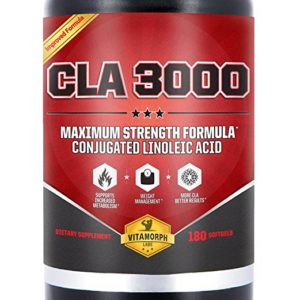
Click here for the lowest price on Amazon
Vitamorph markets itself as the highest-dose CLA supplement out there, but there’s a little more to it than that. Each serving has 3000 mg of fatty acids in it, but a serving is two softgels, not one. And it’s only 80% pure, not the 95% that’s the standard among the top-tier CLA supplements.
Now, all that being said, it’s still not bad–the dose is plenty high enough to get the job done. But don’t let the number on the label trick you: this isn’t your best bet when it comes to big doses.
6. NatureWise CLA 1250
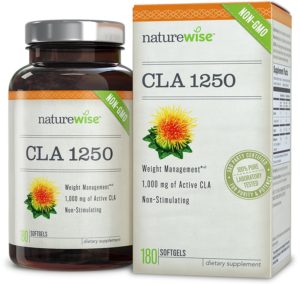
Click here for the lowest price on Amazon
In addition to its “Elite” CLA supplement, NatureWise also makes a lower-dose, less pure version that is their mass-market CLA offering. Though it’s labled “1250,” each capsule only actually contains 780 mg of conjugated linoleic acids; other fatty acids make up the rest of the balance to get to 1250.
Still, despite this, NatureWise CLA 1250 is immensely popular and well-reviewed, and some people appreciate the presence of the other fats like (unconjugated) linoleic acid and oleic acid, as these have purported health benefits as well. If you want these extras, or if you want a dosage closer to 800 mg of CLA per capsule, NatureWise CLA 1250 is a good choice; otherwise, the Elite version is probably better.
7. Nature’s Design CLA
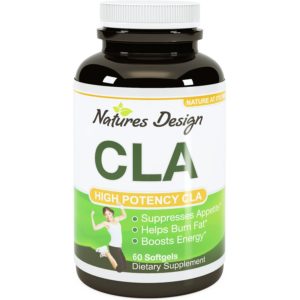
Click here for the lowest price on Amazon
Though it sells well, Nature’s Design is pretty mediocre when it comes to CLA content. Each capsule delivers 780 mg of CLA, alongside some other fatty acids like oleic aid, palmitic acid, and stearic acid. Even at this dosage, however, there are higher-quality supplements out there that are a better call.
Nature’s Design claims it’s “100% natural” but this isn’t a strict or regulated term like “non-GMO” or “organic.” It also claims that it guarantees its purity, but it doesn’t back this up with any independent laboratory testing.
8. Evlution Leanmode
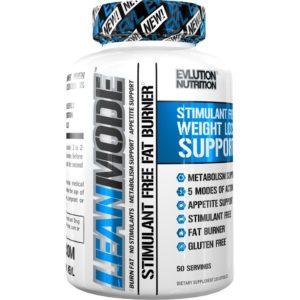
Click here for the lowest price on Amazon
This CLA supplement takes the unique approach of combining CLA with several other weight-loss and fat-burning supplements. Whether this is right for you depends entirely on your supplementation philosophy and your degree of trust in the company’s chemists and nutritionists.
Evlution Leanmode combines CLA with garcinia cambogia, green tea extract, green coffee bean extract, and acetyl-L-carnitine. These ingredients have wide variation in their projected efficacy, from very good (green tea extract) to more up-in-the-air (garcinia cambogia).
9. MusclePharm CLA Core
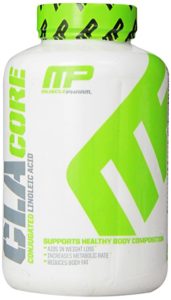
Click here for the lowest price on Amazon
MusclePharm’s CLA supplement is clearly marketed for the bodybuilding crowd. With a target of reducing fat mass without reducing muscle mass, CLA is a bodybuilder’s dream.
The CLA supplement from MusclePharm combines conjugated linoleic acid, olive oil, and avocado oil. Each capsule delivers 1000 mg of oils, but because this is a “proprietary blend,” we can’t actually see what the proportion of each ingredient is.
CLA is listed first, meaning it’s the highest-concentration ingredient, but for all we know each capsule could contain as little as 400 mg of actual CL. This lack of transparency makes it hard to tell what you’re getting, so if you want to monitor your supplement routine, it’s tricky with this supplement.
10. PuraVida Organique CLA 1200
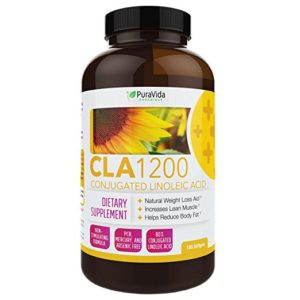
Click here for the lowest price on Amazon
Dock points from this one for being doubly deceptive: despite the name, Pura Vida Organique doesn’t use organic oils to derive its CLA. On top of that, it uses the “proprietary blend” trick to obsure how much CLA is actually included in the supplement. There’s 1200 mg of oils, but how much of that is actually CLA? Your guess is as good as mine.
Part Two: An in-depth look at conjugated linoleic acid
Conjugated linoleic acid (CLA) is a fatty acid naturally occurring in dairy products and beef that has powerful positive health benefits. (1)
Among the most popular weight loss supplements used worldwide, CLA may also reduce the risk of developing type 2 diabetes and cancer. (2, 3, 4)
Large amounts of linoleic acid can be found in vegetable oils, and smaller amounts are found in other foods. Linoleic acid is a polyunsaturated fatty acid, and the most common of the omega-6 fatty acids.
But CLA has a different molecular structure: “conjugated” refers to the way the double bonds are arranged. For those of us who aren’t chemists, understanding how molecular bonds affect the way our bodies react to a substance can be a tough call, but just like with words, colors and facial features, arrangement is everything.
There are two different kinds of double bonds in CLA on the fatty acid chain. The placement of one of these types of bonds is structured in a way that classifies CLA as a trans fat, although it’s natural, and therefore not dangerous like industrially created trans fats that can cause damage in our bodies. (5, 6, 7)
Dietary CLA comes from the meat and dairy products of ruminant animals such as cattle, sheep and goats. The amount of CLA contained in these foods depends entirely on what the animals consumed. (8)
Keep in mind that the majority of animals meeting modern commercial demand for these foods are born and raised in industrial settings, eating mostly grains and soy products. In contrast, dairy animals of past times grazed and foraged, eating what they could find in their environment, including dried grasses and small amounts of grain during cold seasons.
There is a huge difference between the amount of natural CLA found in commercially raised animals and dairy products and grass-fed animals. The CLA content of products from grass-fed cows, including the meat after butchering, delivers between 300% and 500% more CLA than products from animals eating grains. (9)
The estimated average amount of CLA in a typical American diet today is about 150 mg for women and 200 mg for men. (10)
Supplemental CLA is chemically created by altering the molecular bonds in sunflower and safflower oils. This process distorts the ratio of different CLA forms found in natural sources (11, 12), so supplements won’t have the same beneficial effects.
Natural CLA can support weight Loss – Researchers playing around with mice and CLA in 1987 found it helped fight cancer, (13) and years later, other scientists discovered it also contributed to the reduction of body fat in animals. (14)
Here are some of the ways CLA can affect weight in animals: (15, 16, 17, 18)
- Reduces the amount of calories consumed
- Increases the amount of calories burned
- Stimulates the breakdown of stored fat
- Inhibits the production of fat cells
Subsequent human studies indicate CLA may have anti-obesity properties. (19, 20)
Controlled randomized trials on the effects of CLA on weight loss show mixed results. Some indicate CLA can play a role in modifying body composition, reducing fat mass and sometimes even increasing muscle mass. (21, 22, 23)
Other trials didn’t show any effect on participants’ weight. (24, 25, 26)
When researchers correlated data from 18 controlled trials, the results for participants added up to between anywhere between .02 and 3 pounds weight loss per week over a six-month period. (27)
Some side effects were reported, including soft stools, diarrhea and constipation. With the range of different results, it’s possible CLA may have more pronounced effects on some people than others.
Observational studies can’t deliver the same level of evidence-based proof than randomized, controlled trials because of variable factors; that being noted, a number of observational studies indicate people who eat foods containing high levels of natural CLA may enjoy a reduced risk of developing chronic diseases.
Type 2 diabetes appears to develop less frequently when the diet is rich in CLA, as well as a lower incidence of cancer. (28, 29, 30)
People living in countries where cows are grass-fed have higher levels of CLA in their bodies; observational studies confirm their chances of suffering from heart disease are significantly lower. (31)
Whether or not the difference in the incidence of chronic disease is due to adequate levels of CLA has not been established. Grass-fed animal products are also rich in other nutrients with proven health benefits, such as vitamin K2, which affects the distribution of calcium in the body and may prevent heart disease by protecting the arteries.
Evidence shows naturally-occurring CLA can provide health benefits ranging from supporting weight control to protecting against the development of chronic disease.
If you’re considering using supplemental CLA, remember that products are made from chemically altered CLA originating in unhealthy vegetable oils; these supplements have skewed ratios of the natural CLA components found in the meat and products of dairy animals and won’t deliver the benefits of the CLA you’ll get eating grass-fed meat and full-fat dairy products.
Studies show taking large doses of synthetic CLA can contribute to increased accumulation of fat in the liver, known as fatty liver disease. This may lead to type 2 diabetes and metabolic syndrome. (32, 33, 34)
Human and animal studies suggest that even though body fat levels decrease when higher CLA levels are achieved through supplementation, undesirable effects can also occur, including lower HDL cholesterol (the “good” kind), insulin resistance, and increased inflammation. (35, 36)
While the dosage levels in most of these studies were considerably higher than most people might use in a CLA supplement, some followed the recommended amount, so it’s something to consider.
A number of participants in the studies experienced side effects including stomach pain, flatulence, diarrhea and nausea. (37) The chances you’ll experience similar side effects are higher when you take more CLA.
The daily dose used in most studies ranged between 3.2 and 6.4 grams.
Summary: If you want to increase CLA intake and enjoy the potential benefits of regulating weight preventing chronic disease, the safest and most natural way to accomplish this is to buy meat and full-fat dairy products from grass-fed animals.
https://bodynutrition.org/conjugated-linoleic-acid/
No comments:
Post a Comment